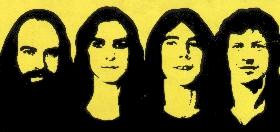



|
| This site has been optimized and designed to be viewed on Mozilla-based browsers. |
Max Webster: Zen Archery For The Well-Rippled MindBy John LamontIt's 1969, okay? The place: Sarnia, the spleen of the Chemical Valley, where it smells funny to this day. Nevertheless, the rock 'n' roll is amazing, courtesy of such Michigan mammals as Mitch Ryder, Ted Nugent, SRC, MC5, and the Stooges. These creatures gnawed the adolescent minds and bodies of eighty percent of the Max Webster membership.(No wonder they turned out to be such a NORMAL outfit.)This knowledge adds new vistas of meaning to, "Get a little savagery in your life," which stands as Pye Dubois' most noble lyrical suggestion to date. But before we get ahead of ourselves, perhaps a short history of who and what Max Webster is should be advanced for the unacquinted. Max Webster is the best Canadian rock band in existence, including Rush, Moxy and all the others. (Those of you who disagree can write me care of this magazine and tell me why I'm wrong. I'm not going to answer any of them, but I will read them all and try not to laugh.) The group was started by Kim Mitchell, the lead singer and guitar player. Kim writes chord sequences and melodies for the songs. Lyrics are provided by Pye Dubois, who does not play with Max Webster onstage, but qualifies as a member nonetheless, due to his function as stimulus and creator of statements. Together they are the core of Max Webster. Terry Watkinson plays keyboards and writes songs by himself. He also sings and does the paintings Max occasionally uses as concert backdrops. He is the only member not from Sarnia, but he's been with the group long enough to have caught the disease, and actually has a warped background of his own. He's an excellent player. I'd take him over Keith Emerson anyday. Plays better synthesizer than Eno, and he paints better too. Gary McCracken drums, and does it intelligently. He has great strategic thinking abilities, and defended Rush drummer Neil Peart's lyrics without ever losing perspective. Smartest drummer I've ever met. The most recent addition is Dave Myles, bassist, replacing Mike Tilka, who moved to the producer's chair. Dave has a superior sense of line and phrasing to Tilka, and he fits right into the band. He gave up a promising future in business to join Max Webster, positive proof that his mind is still alive and kicking. The group has released their third album, Mutiny Up My Sleeve, recorded at Phase One in Toronto. The album is remarkable but, by all accounts, was an ordeal of the first order. The pressure of expectation from every quarter was incredible, particularly since it was the first for their new label, Capitol, who expect an international success from Max. They've got it (the album, that is), but it was a helluva shot to make with all the changes (bass player, label, studio) and the move into the big leagues. Sessions began at Sounds Interchange. "It was a new studio for us. (The first two albums were recorded at Toronto Sound.) We were working on the bed tracks, getting them to feel good, when this uptight vibe started happening, it was just nuts," Mitchell recalled, obviously still a bit exasperated by the experience. "Halfway through, we switched studios, co-producers. Terry Brown, our co-producer, picked up on the ugliness and quit. Forty-eight hours later he was back, saying he'd put up with the weirdness. By that time, we felt strange. So we shut down for two weeks." Asked about the symptoms of the problem, Mitchell started mockingly chewing his nails. With studied calm, Pye Dubois explained, "At times there were overt differences of opinion. It just never seemed to get started." "General sounds," Mitchell contributed. "The sounds of the studio monitors. It didn't sound like us for some reason. Black Sabbath went through the same thing when they came in. We had some beds down and were doing overdubs in another mixing room, and they would come in, freaking out, checking our monitors. "But Phase One is really nice. The halls seethe. Max has really found their element in Phase One. Nice atmosphere, a really nice place to record. The monitors are great, the people are great, and there's enough room. "The tapes from Sounds Interchange that didn't make it, we canned, and just went on to different stuff. We wrote for a week... and now it's done." "Everything has changed from day one," Dubois added. "Everything is an alternative. We even considered changing the title. Even our middle names are different. "I'm just glad it's done." The sessions were particularly rough for Dave Myles, as one might well imagine. He made the decision to join a scant two weeks before the sessions began, so his sterling playing on Mutiny is particularly impressive. "He's working out great," Kim enthused. "Although he's still alittle scared. He came from Sarnia, moved himself and his girlfriend and all his furniture and everything, and plopped himself into this band. He left a solid career where he could have owned a dog and a lawnmower and stuff. Then everything started going weird. He's a new member of the band, recording an album and we're freaking out. You can imagine how he felt. "But he's onto it now. He's just worried about the firecrackers and the bullets in the States." Max Webster, in a big push for major stardom, will be touring constantly in support of Mutiny Up My Sleeve. Kim has tasted the grind of touring before, and seems up for it. "The only thing I really hate about it," he admits, "Is the driving. The rest of it I can handle. It has its crazy moments, because you're constantly around crazy people who think you're weird all the time. At a point when maybe you're having a bad day and feeling a little weird, someone will come up and lay that shit on you. It gets difficult. "But the rest of the time, it's neat. It's a great way to make living, playing for crowds of 16,000 blitzed-out, bloodthirsty puntors. You've got to deliver your goods." Actually, at the majority of Max gigs, the audiences aren't bloodthirsty at all, but this is the kind of thing the other Websters tell Dave to make him feel at home in his new job. No sense in letting him have a moments peace. This is rock 'n' roll, and Max Webster rock 'n' roll in particular requires a fine and precise madness of its perticipants, human energy focused with intricate skill. Look at it this way. Max Webster is like the zen archer, whose entire mind is devoted to the target totally, enabling exact accuracy. The songs are the arrows, aimed into the pool of consciousness formed by the audience members. Each arrow penetrates to the bottom of the pool, releasing attention to the whole Max Webster concept. What's all this mean to you? Don't ask me, Jack, I'm just a reporter. All I know is those arrows fly with an awesome grace, and they make very nice ripples out there. Beyond that, it depends what arises in the mind's eye. "Forget that fear of gravity/Get a little savagery in your life," conjures all kinds of possibilities. |